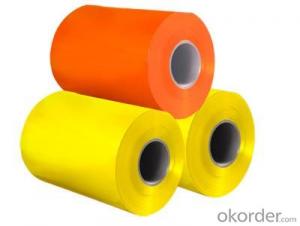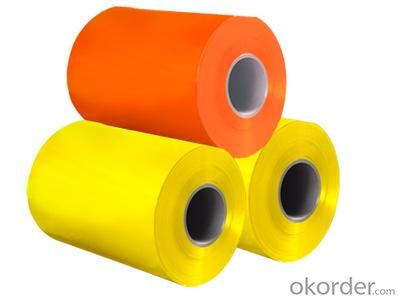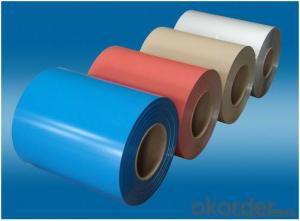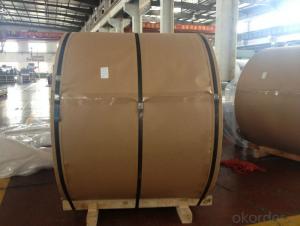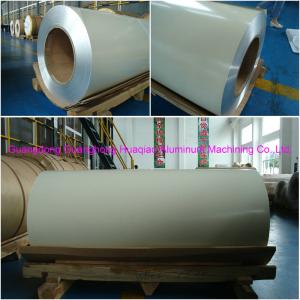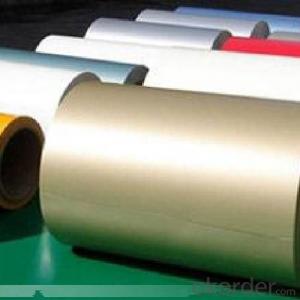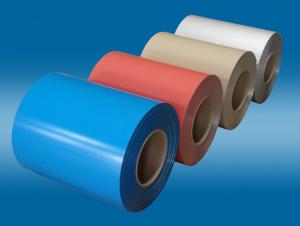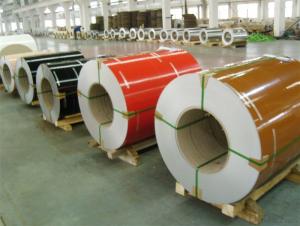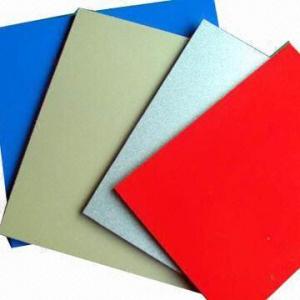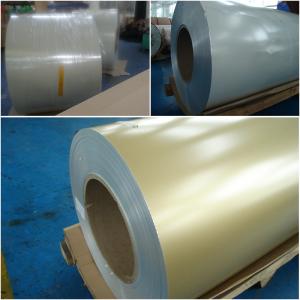Coil Coated Aluminum Sheet - Prepainted Alu Coil Product
- Loading Port:
- China Main Port
- Payment Terms:
- TT OR LC
- Min Order Qty:
- -
- Supply Capability:
- -
OKorder Service Pledge
OKorder Financial Service
You Might Also Like
Aluminium is a relatively soft,durable, lightweight, ductile and malleablemetalwith appearance ranging from silvery to dull gray, depending on the surfaceroughness. It is nonmagnetic and does not easily ignite. A fresh film ofaluminium serves as a good reflector (approximately 92%) of visible light and an excellent reflector (asmuch as 98%) of medium and far infrared radiation. The yield strengthof pure aluminium is 7–11 MPa, while aluminium alloys have yield strengths ranging from200 MPa to 600 MPa. Aluminium has about one-third the density and stiffness of steel.It is easily machined, cast, drawn and extruded.
Aluminium alloys (or aluminum alloys; see spellingdifferences) are alloysin which aluminium(Al) is the predominant metal. The typical alloying elements are copper, magnesium,manganese,silicon,tin and zinc. There are twoprincipal classifications, namely casting alloys and wrought alloys, both of which are furthersubdivided into the categories heat-treatableand non-heat-treatable. About 85% of aluminium is used for wrought products,for example rolled plate, foils and extrusions.Cast aluminium alloys yield cost-effective products due to the low meltingpoint, although they generally have lower tensile strengthsthan wrought alloys. The most important cast aluminium alloy system is Al–Si,where the high levels of silicon (4.0–13%) contribute to give good castingcharacteristics. Aluminium alloys are widely used in engineering structures andcomponents where light weight or corrosion resistance is required
Features:
1. Excellent quality of products
2. Quick delivery
3. Best service to clients
4. BV,SGS avalible
5. No buckle o waveness
6. Tension leveling
7. Certificate of Origin
8. Form A,E
Packaging Detail: Carton ,Wooden pallet with plastic protection packing,standard seaworthy packing or as your request.
ProductionCapacity:
AnnualProduction capacity of 600,000 tons.
Products areexported to United States, Canada, U.A.E, Brazil, Mexico,Thailand, Vietnam,Nigeria etc, over 100 countries andregions all over the world.
Coveredfactories with full production line
CNBM aluminumproduction base is comprised of 18 aluminumannealers, 10 coil and foilmills, 4 continuous production lines, 2hot rolling production line and 3prepainted lines.
FAQ:
1. What is the form of payment?
Normally 30% TT, L/C
2. Type of quotation?
FOB, CFR, CIF
3. Port of loading?
Shanghai port
4. Delivery time?
30 day after client’s deposit
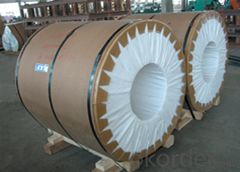
- Q: What is a common reaction of this element?What is another element closely related to Aluminum?Thank youuuuu.
- Al + Cl2 --- AlCl3 aluminum trichloride is an important substance used in several organic chemical reactions of indistrial importance. It is what is called a Lewis acid, something you will get to. Possibly gallium, just below it in the periodic table.
- Q: Can aluminum coils be used in food processing applications?
- Food processing applications can utilize aluminum coils, as they offer a range of advantages. Aluminum is a widely used and highly adaptable material in the food industry due to its various benefits. Aluminum coils are lightweight, durable, and possess excellent thermal conductivity, which makes them suitable for applications requiring efficient and uniform heat transfer. When it comes to food processing, aluminum coils are commonly employed in equipment such as heat exchangers, evaporators, and refrigeration units. These coils help to cool, heat, or maintain the temperature of different food products during their processing, storage, or transportation. The exceptional thermal conductivity of aluminum ensures that heat is evenly dispersed, thereby aiding in the preservation of food quality and flavor. Furthermore, aluminum is a non-toxic and non-reactive metal, meaning it has no adverse effects on the taste or composition of the processed food. It is also naturally resistant to corrosion, ensuring that the coils do not contaminate the food and can be easily cleaned and maintained. In addition, aluminum is an environmentally friendly and recyclable material, aligning with the increasing demand for sustainable practices in the food industry. Its lightweight nature also contributes to energy efficiency and reduced transportation expenses. In conclusion, aluminum coils are a reliable, efficient, and safe choice for food processing applications. They meet the strict requirements of the industry while ensuring the quality and safety of the processed food.
- Q: I'm doing a science project on Aluminum and need to know what the other metals are in the following ores:BauxiteCryoliteGibbsiteI have to know what percentage of it is which metal. Don't know if that makes much sense, but I really need help because I can't find the answer anywhere. Thanks :D
- The bauxite is a sedimentary rock of chemical origin composed for the most part by alumina (Al2O3) and, in smaller measure, iron oxide and silica. It is the main aluminum source used by the industry. It is a residual taken place by the meteorización of the igneous rocks under conditions geomorfológicas and climatic favorable. Molecular formula: Na3AlF6 Synonym: Fluoroaluminato of sodium. Chemisorption of catechol on gibbsite, boehmite, and noncrystalline alumina... Alumina; Aluminium Oxyhydroxyde
- Q: What are the different joining methods for aluminum coils?
- Depending on the specific application and desired bond strength, there are multiple methods available for joining aluminum coils. Some commonly used techniques include: 1. Welding: TIG welding, MIG welding, and laser welding are all viable options for welding aluminum coils. These methods create a robust and long-lasting bond that ensures structural integrity. 2. Brazing: By melting a copper-based alloy filler material, two aluminum coils can be joined together. Brazing is particularly useful for joining thin aluminum coils and provides a strong and leak-proof connection. 3. Adhesive bonding: This non-destructive method involves using a high-strength adhesive to bond the aluminum coils. Adhesive bonding is often preferred for applications where aesthetics and surface finish are vital, as it does not leave any visible welding or brazing marks. 4. Mechanical joining: Techniques such as riveting, clinching, and using fasteners like screws or bolts are categorized under mechanical joining. These methods offer a reliable and easily reversible bond, making them suitable for applications that require disassembly. 5. Roll bonding: Roll bonding is a process that involves passing two or more aluminum coils through a rolling mill under high pressure, resulting in the creation of a single composite coil. This method is commonly employed for joining dissimilar metals or creating laminated structures with different alloy combinations. Each joining method has its own advantages and limitations, and the choice depends on factors such as desired strength, cost, production volume, and specific application requirements. It is crucial to carefully consider these factors to ensure the most appropriate method is selected for aluminum coil applications.
- Q: Can aluminum coils be used in the manufacturing of electronic devices?
- Yes, aluminum coils can be used in the manufacturing of electronic devices. Aluminum is a versatile and widely-used material in various industries, including electronics. Aluminum coils are often used in the construction of transformers, inductors, and other components of electronic devices. One of the main advantages of using aluminum coils in electronic devices is their lightweight nature. Aluminum is much lighter than other commonly used materials like copper, which makes it easier to handle and transport. Additionally, aluminum has good thermal conductivity, allowing for efficient heat dissipation within electronic devices. Furthermore, aluminum coils are resistant to corrosion, which is crucial in electronic applications where the devices may be exposed to moisture or other harsh environments. This corrosion resistance helps to prolong the lifespan of the electronic device and ensures its reliability. Moreover, aluminum coils can be easily formed into various shapes and sizes, making them suitable for different electronic device designs. They can be customized to meet specific requirements, such as fitting into compact spaces or achieving specific electrical characteristics. Overall, aluminum coils offer several advantages in the manufacturing of electronic devices, including their lightweight nature, good thermal conductivity, corrosion resistance, and flexibility in design.
- Q: This question asks for methods to assess the quality of aluminum coils, which is important for various industries that use aluminum for manufacturing and construction.
- <p>To check the quality of aluminum coils, you should inspect for surface defects such as scratches, dents, or discoloration. Measure the thickness and width to ensure they meet specifications. Test the hardness and tensile strength to verify mechanical properties. Conduct a chemical analysis to confirm the alloy composition. Check for internal defects using non-destructive testing methods like ultrasonic testing. Assess the coil's flatness and straightness to prevent issues in further processing. Finally, ensure proper packaging and storage conditions to maintain coil quality.</p>
- Q: What can I get easily at Home Depot that will successfully bond rubber to aluminum?? I have tried several things with no success! Surely, there must be some sort of construction adhesive to do the job.Thanks!
- have you tried a strong adhesive such as crazy glue? i'm sure that'll bond to anything but try sand down the rubber before you put on the glue so it holds, hope i've helped?
- Q: An they say aluminum can cause breast cancer in some.
- actually, it's usually ANTI-PERSPIRANTS that contain aluminum. what the aluminum does, is block the sweat from exiting your sweat glands, therefore, keeping your underarms dry. however, your body sweats for a couple reasons: one being the method to rid toxins. when you block the main glands, which just so happen to be under your arms, you risk keeping those toxins in your body. Now, deodorant on the other hand, allows you to naturally perspire, but just adds an aroma if you will so that you won't smell funky. it won't keep you as dry, though. i would love to be able to use plain deodorant or the organic kind you mentioned, but i sweat a lot must resort to using anti-perspirants. if you must, just keep it to a minimum. for example, don't use at night. let your body cleanse itself while you sleep at least
- Q: What benefits does anodized aluminum offer when compared to regular aluminum coils?
- <p>Anodized aluminum coils offer several advantages over standard ones. They have enhanced corrosion resistance due to the protective oxide layer formed during the anodizing process. This layer also improves wear resistance and increases the coil's durability. Anodized coils can be easily colored, providing a wide range of aesthetic options without affecting the material's performance. Additionally, the anodized surface is more resistant to scratches and can maintain a polished appearance longer. Overall, anodized aluminum coils are more robust, visually appealing, and longer-lasting compared to standard aluminum coils.</p>
- Q: How are aluminum coils used in heat exchangers?
- Aluminum coils are widely used in heat exchangers due to their excellent thermal conductivity and corrosion resistance properties. Heat exchangers are devices that transfer thermal energy between two or more fluids, and aluminum coils play a crucial role in facilitating this heat transfer process. In a typical heat exchanger, aluminum coils are used as the primary component for the heat transfer surface. These coils are usually made of thin aluminum sheets that are formed into a tube-like shape, creating a large surface area for efficient heat transfer. The coils are often arranged in a serpentine pattern to maximize the contact area between the fluid being heated or cooled and the coil surface. The fluid that needs to be heated or cooled passes through the coil, while another fluid, usually water or air, flows over the coil surface. As the fluids come into contact with the aluminum coil, heat is transferred from one fluid to the other through conduction. The high thermal conductivity of aluminum allows for quick and efficient heat transfer, resulting in effective temperature control. Moreover, aluminum coils are highly resistant to corrosion, which is crucial for heat exchangers that come into contact with various fluids, some of which may be corrosive. This corrosion resistance ensures the longevity and durability of the heat exchanger, reducing maintenance and replacement costs. Additionally, aluminum coils are lightweight and easily formable, making them suitable for different heat exchanger designs and configurations. This flexibility allows manufacturers to create compact and space-efficient heat exchangers that can be installed in various applications, such as HVAC systems, refrigeration units, automotive radiators, and industrial processes. In conclusion, aluminum coils are used in heat exchangers due to their excellent thermal conductivity, corrosion resistance, lightweight nature, and formability. These coils effectively transfer heat between fluids, ensuring efficient temperature control and enabling the proper functioning of various heating and cooling systems.
Send your message to us
Coil Coated Aluminum Sheet - Prepainted Alu Coil Product
- Loading Port:
- China Main Port
- Payment Terms:
- TT OR LC
- Min Order Qty:
- -
- Supply Capability:
- -
OKorder Service Pledge
OKorder Financial Service
Similar products
Hot products
Hot Searches
Related keywords
